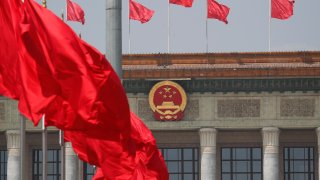
- China's aggression, coupled with the rise of its military, could result in a "military accident," said Orville Schell, the Arthur Ross director of Asia Society's Center on U.S.-China Relations.
- China has been flexing its geopolitical muscles over the past year, which has caused its relationships with several countries to deteriorate.
- International pressure has not eroded domestic support for the Chinese Communist Party and Chinese President Xi Jinping, said Robert Daly, director of the Wilson Center's Kissinger Institute on China and the United States.
As the Chinese Communist Party celebrates the 100th year since its founding this week, an analyst has warned of the "immense danger" from Beijing's increasing aggression on the global stage.
Orville Schell, the Arthur Ross director of Asia Society's Center on U.S.-China Relations, said China's aggression — coupled with the rise of its military — could result in a "military accident, even a military clash."
Get South Florida local news, weather forecasts and entertainment stories to your inbox. Sign up for NBC South Florida newsletters.
"If that comes to pass, that could spell the end of China's dream, it could end the global market system, it could be the upending of many, many things as we know it today," Schell told CNBC's "Squawk Box Asia" on Monday.
"And that's why this is such an immense danger, that China's wolf warrior diplomacy — its aggressiveness which seems bent on doing what it wants to do regardless of what anyone else thinks — is such a danger," he added.
China has been flexing its geopolitical muscles over the past year, when much of the world was grappling with the Covid-19 pandemic. That has caused its relationships with several countries to deteriorate.
Money Report
Among other things, China slapped trade sanctions on Australia, had a military clash with India along the border the two countries share, and has effectively taken control of parts of the disputed South China Sea, where China and several Southeast Asian countries have overlapping territorial claims.
Chinese diplomats overseas have also become more aggressive against other countries, both in person and on Twitter — a platform banned on the mainland. Some analysts have dubbed the approach "wolf warrior diplomacy" after nationalistic Chinese action movies of a similar name.
"I think it is a stunning fact that China, just as it becomes successful and more wealthy and more powerful, has managed to alienate one country after another," said Schell.
Domestic support for the CCP
International pressure has also been piling on China. The U.S. under President Joe Biden is keen to rally its allies to call out China's alleged human rights abuses and non-market practices.
In March, the U.S. and its allies — including the European Union, the U.K. and Canada — imposed sanctions on Chinese officials for alleged human rights abuses against ethnic minorities in the western region of Xinjiang. Beijing retaliated with sanctions of its own.
The U.S. and the U.K. are among countries that have spoken up against China's tightening grip on Hong Kong, a former British colony that returned to Chinese rule in 1997.
But that pressure has not eroded domestic support for the Chinese Communist Party and Chinese President Xi Jinping, said Robert Daly, director of the Wilson Center's Kissinger Institute on China and the United States.
Daly said Monday that for the most part, the Chinese government and its people judge their country "against its own its history and its own experience" — and are less interested in comparing with the rest of the world.
"So as long as most Chinese people see their standards of living, their standards of technological well-being, health outcomes, educational outcomes improving, then they tend to support the Chinese government," he told CNBC's "Street Signs Asia."
"And criticisms from outside of China, including criticisms about Hong Kong and Xinjiang, are widely seen as attacks on China that are intended to keep China down."






